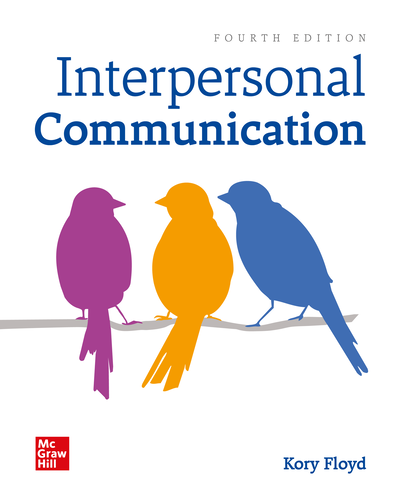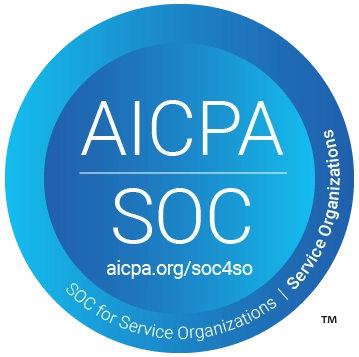Log In to My PreK-12 Platform


Interpersonal Communication, 4th Edition
Format Options:
-
Lowest Price!
eBook from $54.00 -
Print from $70.00 -
Connect from $107.07
McGraw Hill eBook
Textbook Rental (150 Days Access)
- Rent for a fraction of the printed textbook price
- Complete text bound in hardcover or softcover
Loose-Leaf Purchase
Unbound loose-leaf version of full text
Shipping Options
- Standard
- Next-day air
- 2nd-day air
Orders within the United States are shipped via FedEx or UPS Ground. For shipments to locations outside of the U.S., only standard shipping is available. All shipping options assume the product is available and that processing an order takes 24 to 48 hours prior to shipping.
Note: Connect can only be used if assigned by your instructor.
Connect (180 Days Access)
- Digital access to a comprehensive online learning platform
- Includes homework, study tools, eBook, and adaptive assignments
- Download the free ReadAnywhere app to access the eBook offline
Connect + Loose-Leaf
- Comprehensive online learning platform + unbound loose-leaf print text package
- Connect includes homework, study tools, eBook, and adaptive assignments
- Download the free ReadAnywhere app to access the eBook offline
Shipping Options
- Standard
- Next-day air
- 2nd-day air
Orders within the United States are shipped via FedEx or UPS Ground. For shipments to locations outside of the U.S., only standard shipping is available. All shipping options assume the product is available and that processing an order takes 24 to 48 hours prior to shipping.
* The estimated amount of time this product will be on the market is based on a number of factors, including faculty input to instructional design and the prior revision cycle and updates to academic research-which typically results in a revision cycle ranging from every two to four years for this product. Pricing subject to change at any time.
Instructor Information
Quick Actions (Only for Validated Instructor Accounts):
Interpersonal Communication helps students see how communication not only affects their relationships but also influences their health, happiness, and quality of life. Author Kory Floyd encourages students to go beyond commonsense notions about communication and helps them see the value of investigating interpersonal processes - both face-to-face and online - in a systematic manner.
Interpersonal Communication meets students where they are, speaking to them in a way that interests them and helping them to use both the content and the cognitive tools to relate theories and concepts to their own experiences. In this new edition, the following features enhance Kory Floyd’s unique and engaging approach to interpersonal communication:
Seamless integration of scholarship, theory, and skills. By combining the latest research with the everyday scenarios learners face, Kory Floyd presents a systematic and modern approach to the study of interpersonal communication that helps students build vital interpersonal skills and make sound choices—academically, personally, and professionally.
Emphasis on critical thinking and self-reflection. Students will have numerous opportunities to make connections between the text and their own lives, as well as to consider how their communication choices influence the outcomes they experience.
Examples with real-world relevance relate content to real life. Chapter-opening vignettes and examples throughout the chapters enliven the content and allow learners to study interpersonal communication in an engaging way that directly relates to them.
Online and electronically mediated communication integrated in every chapter. Every chapter includes comprehensive coverage of technology and digital devices’ influence on interpersonal communication, from online deception and relational maintenance via tests to improving listening and emotional expression when online.
Culture, gender and diversity are integrated throughout the text. Every chapter includes essential information about how culture, gender, and sexual identity affect communication. Throughout the new edition, coverage of gender and sexuality topics has been updated to reflect the latest scholarship as well as cultural conventions for applying gender-neutral pronouns and using inclusive language.
Enhanced coverage of deceptive communication. Unique in its focus on the timely and critical topic of deceptive communication, Chapter 12 now features enhanced coverage of, and guidance for responding to, the various types of deception students encounter in their daily lives, including high-profile lying and lying through dating apps.
Chapter Two: Culture and Gender
Chapter Three: Communication and the Self
Chapter Four: Interpersonal Perception
Chapter Five: Language
Chapter Six: Nonverbal Communication
Chapter Seven: Listening
Chapter Eight: Emotion
Chapter Nine: Forming and Maintaining Personal Relationships
Chapter Ten: Interpersonal Communication in Close Relationships
Chapter Eleven: Interpersonal Conflict
Chapter Twelve: Deceptive Communication
Main Features
- LMS Integration
- Print/Loose-Leaf Book Add-On Availability
- Presentation Slides & Instructor Resources
- Question & Test Banks
- Adaptive Assignments
- Student Progress Reporting & Analytics
- Essay Prompts
- Polling
- Prebuilt Courses
- Interactive Exercises
- eBook Access (ReadAnywhere App)
- Remote Proctoring (Proctorio)
- Subject-Specific Tools
About the Author
Kory Floyd
Kory Floyd is a professor of communication and professor of psychology at the University of Arizona. His research focuses on interpersonal communication in a variety of contexts, with particular focus on how positive communication contributes to well-being. He has written 16 books and more than 100 scientific papers and book chapters on the topics of interpersonal behavior, emotion, nonverbal behavior, and health. He is a former editor of Communication Monographs and Journal of Family Communication, and he is an elected fellow of the International Communication Association. His work has been recognized with the Charles H. Woolbert Award, the Bernard J. Brommel Award, and the Mark L. Knapp Award from the National Communication Association, as well as the Distinguished Scholar Award from the Western States Communication Association and the Early Career Achievement Award from the International Association for Relationship Research. As an educator, he teaches courses on interpersonal communication, communication theory, nonverbal communication, and quantitative research methods. Professor Floyd received his undergraduate degree from Western Washington University, his master’s degree from the University of Washington, and his PhD from the University of Arizona.
Accessibility
Creating accessible products is a priority for McGraw Hill. We make accessibility and adhering to WCAG AA guidelines a part of our day-to-day development efforts and product roadmaps.
For more information, visit our accessibility page, or contact us at accessibility@mheducation.com
Affordability
Reduce course material costs for your students while still providing full access to everything they need to be successful. It isn't too good to be true - it's Inclusive Access.
Need support? We're here to help - Get real-world support and resources every step of the way.

